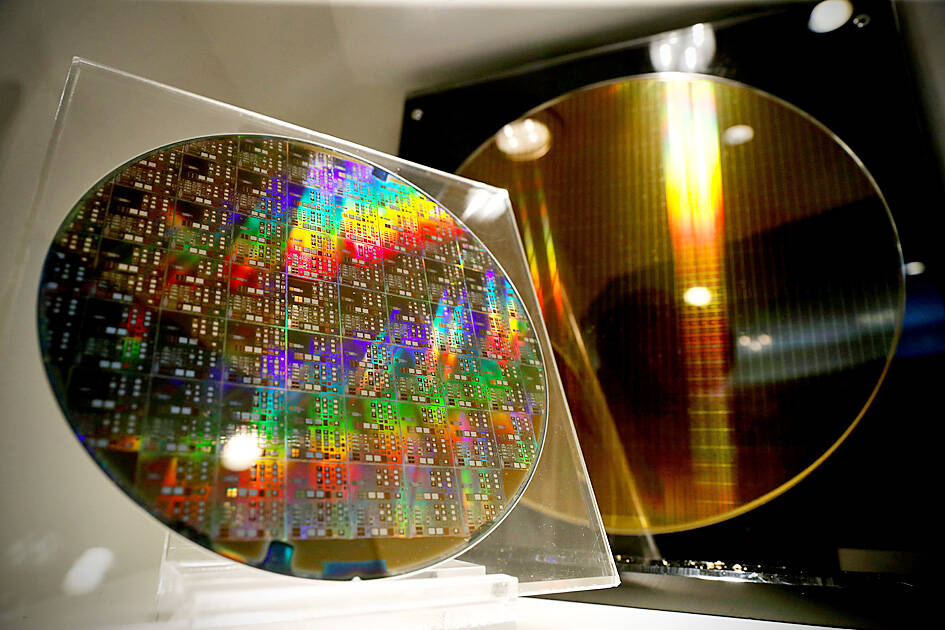Taiwan Semiconductor Manufacturing Co (TSMC, 台積電) remained the world’s largest contract chipmaker in the second quarter of the year with a 53.4 percent share of the global pure-play foundry market, the Taipei-based market information advisory firm TrendForce Corp (集邦科技) said in a research report on Tuesday.
Despite TSMC’s market share dipping slightly from 53.6 percent in the first quarter, it was still far ahead of its rivals, TrendForce said.
TSMC continued to benefit from emerging technologies, such as high-performance computing devices, the Internet of Things and automotive electronics, as it posted US$18.15 billion in sales in the second quarter, up 3.5 percent from a quarter earlier, it said.

Photo: Ritchie B. Tongo, EPA-EFE
The mild quarter-on-quarter sales growth during the period from April to June reflected a relatively high comparison base in the first quarter, when TSMC raised chip prices amid a global supply shortage, TrendForce said.
South Korea’s Samsung Electronics Co placed second with a 16.5 percent global market share, as it posted US$5.59 billion in sales, up 4.9 percent from a quarter earlier, the report showed.
Taiwan’s United Microelectronics Corp (UMC, 聯電) took third spot with US$2.45 billion in sales and a 7.2 percent global share in the second quarter, TrendForce said.
UMC’s second-quarter sales rose 8.1 percent from a quarter earlier on the back of support from its 22 and 28 nanometer processes, it added.
US-based GlobalFoundries Inc was the fourth-largest contract chipmaker with a 5.9 percent global market share after posting US$1.99 billion.
China’s Semiconductor Manufacturing International Corp (SMIC, 中芯國際), which posted US$1.90 billion in sales and held a 5.6 percent global market share, placed fifth, TrendForce said.
China’s Hua Hong Semiconductor Ltd (華虹半導體) came in sixth with a 3.1 percent global market share after posting US$1.06 billion in sales, followed by Taiwan’s Powerchip Semiconductor Manufacturing Corp (力積電) with US$656 million in sales and 1.9 percent in market share, Taiwan’s Vanguard International Semiconductor Corp (世界先進) with US$520 million in sales and 1.5 percent in market share, South Korea’s Nextchip Co with US$463 million in sales and 1.4 percent in market share, and Israel’s Tower Semiconductor Ltd with US$426 million in sales and 1.3 percent in market share, TrendForce said.
The top 10 contract chipmakers posted US$33.2 billion in combined sales in the second quarter, up 3.9 percent from a quarter earlier, accounting for 98 percent of global revenue, it said.
Sales growth momentum of the 10 largest contract chipmakers showed signs of slowing in the second quarter, as global demand for consumer electronics gadgets weakened, it added.
Inventory adjustments are expected to continue to affect the pure-play foundry business in the third quarter, TrendForce said, adding that Apple Inc’s launch of a new iPhone model is expected to lend support to the sector in the third quarter.

Shares in Taiwan closed at a new high yesterday, the first trading day of the new year, as contract chipmaker Taiwan Semiconductor Manufacturing Co (TSMC, 台積電) continued to break records amid an artificial intelligence (AI) boom, dealers said. The TAIEX closed up 386.21 points, or 1.33 percent, at 29,349.81, with turnover totaling NT$648.844 billion (US$20.65 billion). “Judging from a stronger Taiwan dollar against the US dollar, I think foreign institutional investors returned from the holidays and brought funds into the local market,” Concord Securities Co (康和證券) analyst Kerry Huang (黃志祺) said. “Foreign investors just rebuilt their positions with TSMC as their top target,

REVENUE PERFORMANCE: Cloud and network products, and electronic components saw strong increases, while smart consumer electronics and computing products fell Hon Hai Precision Industry Co (鴻海精密) yesterday posted 26.51 percent quarterly growth in revenue for last quarter to NT$2.6 trillion (US$82.44 billion), the strongest on record for the period and above expectations, but the company forecast a slight revenue dip this quarter due to seasonal factors. On an annual basis, revenue last quarter grew 22.07 percent, the company said. Analysts on average estimated about NT$2.4 trillion increase. Hon Hai, which assembles servers for Nvidia Corp and iPhones for Apple Inc, is expanding its capacity in the US, adding artificial intelligence (AI) server production in Wisconsin and Texas, where it operates established campuses. This

H200 CHIPS: A source said that Nvidia has asked the Taiwanese company to begin production of additional chips and work is expected to start in the second quarter Nvidia Corp is scrambling to meet demand for its H200 artificial intelligence (AI) chips from Chinese technology companies and has approached contract manufacturer Taiwan Semiconductor Manufacturing Co (TSMC, 台積電) to ramp up production, sources said. Chinese technology companies have placed orders for more than 2 million H200 chips for this year, while Nvidia holds just 700,000 units in stock, two of the people said. The exact additional volume Nvidia intends to order from TSMC remains unclear, they said. A third source said that Nvidia has asked TSMC to begin production of the additional chips and work is expected to start in the second

US President Donald Trump on Friday blocked US photonics firm HieFo Corp’s US$3 million acquisition of assets in New Jersey-based aerospace and defense specialist Emcore Corp, citing national security and China-related concerns. In an order released by the White House, Trump said HieFo was “controlled by a citizen of the People’s Republic of China” and that its 2024 acquisition of Emcore’s businesses led the US president to believe that it might “take action that threatens to impair the national security of the United States.” The order did not name the person or detail Trump’s concerns. “The Transaction is hereby prohibited,”